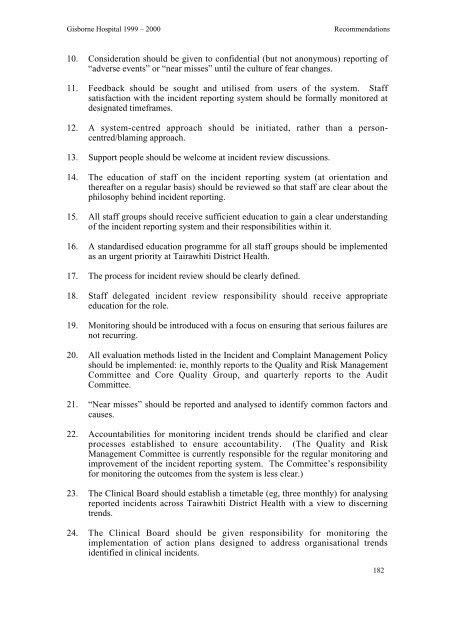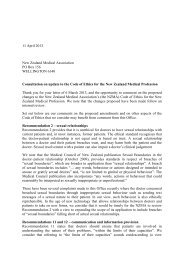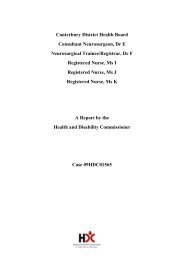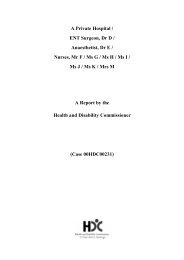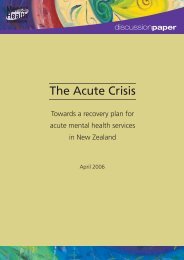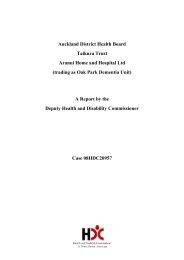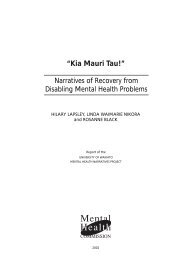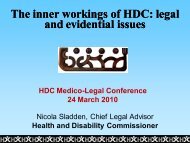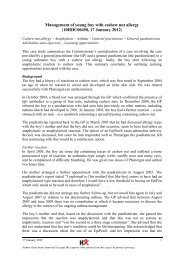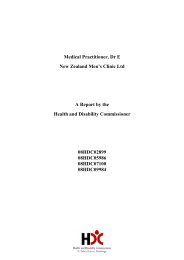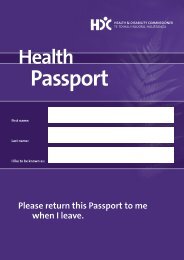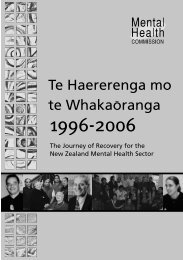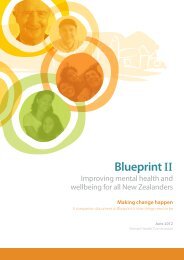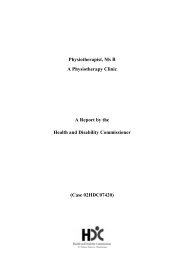Gisborne Hospital Report - Health and Disability Commissioner
Gisborne Hospital Report - Health and Disability Commissioner
Gisborne Hospital Report - Health and Disability Commissioner
You also want an ePaper? Increase the reach of your titles
YUMPU automatically turns print PDFs into web optimized ePapers that Google loves.
<strong>Gisborne</strong> <strong>Hospital</strong> 1999 – 2000<br />
Recommendations<br />
10. Consideration should be given to confidential (but not anonymous) reporting of<br />
“adverse events” or “near misses” until the culture of fear changes.<br />
11. Feedback should be sought <strong>and</strong> utilised from users of the system. Staff<br />
satisfaction with the incident reporting system should be formally monitored at<br />
designated timeframes.<br />
12. A system-centred approach should be initiated, rather than a personcentred/blaming<br />
approach.<br />
13. Support people should be welcome at incident review discussions.<br />
14. The education of staff on the incident reporting system (at orientation <strong>and</strong><br />
thereafter on a regular basis) should be reviewed so that staff are clear about the<br />
philosophy behind incident reporting.<br />
15. All staff groups should receive sufficient education to gain a clear underst<strong>and</strong>ing<br />
of the incident reporting system <strong>and</strong> their responsibilities within it.<br />
16. A st<strong>and</strong>ardised education programme for all staff groups should be implemented<br />
as an urgent priority at Tairawhiti District <strong>Health</strong>.<br />
17. The process for incident review should be clearly defined.<br />
18. Staff delegated incident review responsibility should receive appropriate<br />
education for the role.<br />
19. Monitoring should be introduced with a focus on ensuring that serious failures are<br />
not recurring.<br />
20. All evaluation methods listed in the Incident <strong>and</strong> Complaint Management Policy<br />
should be implemented: ie, monthly reports to the Quality <strong>and</strong> Risk Management<br />
Committee <strong>and</strong> Core Quality Group, <strong>and</strong> quarterly reports to the Audit<br />
Committee.<br />
21. “Near misses” should be reported <strong>and</strong> analysed to identify common factors <strong>and</strong><br />
causes.<br />
22. Accountabilities for monitoring incident trends should be clarified <strong>and</strong> clear<br />
processes established to ensure accountability. (The Quality <strong>and</strong> Risk<br />
Management Committee is currently responsible for the regular monitoring <strong>and</strong><br />
improvement of the incident reporting system. The Committee’s responsibility<br />
for monitoring the outcomes from the system is less clear.)<br />
23. The Clinical Board should establish a timetable (eg, three monthly) for analysing<br />
reported incidents across Tairawhiti District <strong>Health</strong> with a view to discerning<br />
trends.<br />
24. The Clinical Board should be given responsibility for monitoring the<br />
implementation of action plans designed to address organisational trends<br />
identified in clinical incidents.<br />
182


